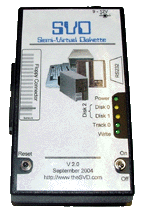|
|
The SVD is no longer in production. Sorry!
 |
You've just received your SVD - now what do you do? Click here!. |

|

| The SVD is a small hobbyist hardware device
that emulates an old floppy drive. Through an RS232 interface on
your Windows or Linux box, you can download a floppy image to the
SVD and then boot your favorite old program on your old machine
just as if you had the floppy disk itself. With the included
software, you can easily run entire diskette images or single files
such as BASIC programs. The SVD was created originally for the
TRS-80, but has expanded to include the Heathkit H8, Apple ][ and others.
The little diagram below shows
the SVD connected to an Apple //+. The SVD is
depicted about twice real size. You can see the actual size of
the SVD in the picture below that (the one with the cover off
of the SVD - that's my hand). |
What is the SVD good for?
 You can run your favorite old program on
your old hardware easily, and without making any modifications to your
old machine...the SVD looks just like a floppy drive to it.You
don't have to open up your PC either.
You can run your favorite old program on
your old hardware easily, and without making any modifications to your
old machine...the SVD looks just like a floppy drive to it.You
don't have to open up your PC either.
- You can easily create a real floppy disk of your
favorite program or DOS by booting DOS from the SVD and running
the standard backup program targeting a blank floppy in one of
your existing drives
- You can back-up or make "images" your exiting
software collection, saving it for posterity.These images are
loaded up to your PC in standard formats.
There are some pretty nice ways to
get software to and from your old machine, but the SVD is probably the
easiest. You don't have to open up a single computer, either the target old machine or
the PC. Further, you don't have to have a spare 5 1/4 inch PC drive
laying around. For the SVD, you just need a old machine with floppy
drive capability (like the expansion interface for the TRS-80) and a PC with
an RS232 port running either Windows or Linux. Sure, you need some
floppy images too.
The SVD is based upon a PIC micro-controller
along with some memory. It listens to the floppy control signals from
your old computer and generates the appropriate
"floppy-looking" signals back, convincing it that it is talking to a real floppy
drive. The old machine will then blissfully boot and read from the
SVD.
The SVD is plugged into
your Windows or Linux box through a standard RS232 (serial)
port, operating between 9600 and 115200 baud. Through programs running
on your PC, you down/up-load the SVD and control its
operation. The PC interface includes capability to
read/write "standard" diskette formats.
|
 |
The SVD is a "work in progress" and has the
following features. Note that some of the features aren't
checked-off. In some cases, the feature is not planned. In others
the feature is in the works. In these cases, the hardware platform supports
the feature, but it's now simply a matter of software. :-)
One
feature in particular, double sided, isn't supported by the hardware
because memory requirements for DS DD (the most popular use of double sided) are more than the 256K currently on
board. Apologies to the TI99/4a fans who really need DS SD now...I know that MANY of the TI99/4a disk images are double sided.
Each individual platform that the SVD supports
has its own set of supported features, too. So please take a
look at your desired machine to see any notes or modifications to
this feature set.
 | Up to three diskette images can be loaded at once (drive 0, 1, and 2) up to 256k
|
 | single-sided single density (SS SD)
|
 | double density (SS DD)
|
 | double-sided - the SVD II (coming someday :-) will support DS DD and DS SD with 1MB of memory
|
 | reading/booting the diskette image
|
 | writing the diskette image
|
 | pretty LEDs for power, drive0/1/2, track0, and write
|
|
|
 | TRS-80 Support (Model 1, 3, 4, 4P and CoCo)
|
 | Heathkit Support (H8, H89)
|
 | TI99/4a Support - not including DS SD, see above
|
 | Apple ][ support
|
 | Write capability for Apple ][ disks
|
|
|
 | Runs most copy-protected software
|
 | Can copy or back-up "normal" software
|
 | Can copy or back-up copy-protected software
|
| |
The SVD was built for fun, and was
built with parts that were easy to come by and easy to use. Total
parts cost is around $60. Schematics, board layout, and all software
can be found here, so feel free to build one yourself. What I
recommend, though, is that you just buy one here. I don't intend to
make any money off of the SVD; whatever profit beyond the cost of
parts will be donated to worthy vintage computer sites and
concerns.
|
|




![Apple ][](Images/apple2.gif)

 You can run your favorite old program on
your old hardware easily, and without making any modifications to your
old machine...the SVD looks just like a floppy drive to it.You
don't have to open up your PC either.
You can run your favorite old program on
your old hardware easily, and without making any modifications to your
old machine...the SVD looks just like a floppy drive to it.You
don't have to open up your PC either.